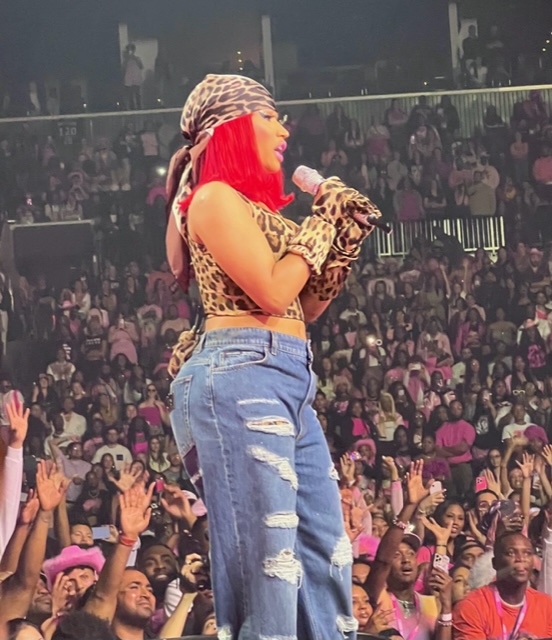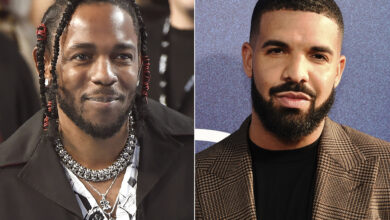Raise the Queens of the Music Industry
COMMENTARY: Last night, Nicki Minaj sold out the Barclays Center for her Pink Friday 2 World Tour. Yet, female artists still struggle to get recognized by industry peers, even after achieving record-breaking sales and massive fan bases.

By Erick Diaz
A wise woman once said, “You have to be a beast; that is the only way they will respect you. When a man is assertive, he is boss, but when I am assertive, I’m a b**ch.” That musical sage was Nicki Minaj on MTV in 2010. Little did she know that speech would become a staple in pop culture.
For years women have struggled for equality in all careers. Though seemingly more glamourous, the music industry is no exception to this plight. Though we seem to live in a Beyonce, Taylor Swift, and Nicki Minaj world, women still face various struggles in the music industry. When people go to a Drake concert, they praise him based on his rapping and crowd command, but when people see fellow rapper Doja Cat, they bash her if she doesn’t dance. What is the difference? Women are expected to wear “jaw-dropping outfits” on red carpets and on tour, while Ed Sheeran gets praised for wearing the same black shirt with jeans in every arena he performs.
Looking at the nominees for the “big categories” at the Grammys in the last ten years, a study done by Statista shows that the percentages of women nominees are disgustingly low. For “Record of The Year,” 11.1% of women have been nominated. “Song of the Year” is higher than ROTY with 29.2%. “Album of the Year” is as low as 10.3%, while the coveted, “Producer of the Year” has only 1.7% of female nominees. In 2019, former CEO Deborah Dougan filed a complaint against the Academy, accusing them of racism, sexism, fraud. Unfortunately, the claims are unsurprising, as the Grammys have made it clear that they are predominantly older white men who are out of touch with the current state of the music industry. We need more women in big executive positions, women who are not afraid to go up and fight for the daily injustices female artists face in the music industry.
In 2018, the Recording Academy was under fire due to the lack of female representation in the nominees. When Neil Portnow, CEO at the time, was asked about the discrepancy, he simply responded, “women need to step up,” a comment that left many music fans disgusted and outraged. During the eligibility period, artists like Taylor Swift, Lana Del Rey, and SZA dropped critically acclaimed projects, but they all missed out on an Album of the Year nod. SZA was the most nominated female artist that year but left empty-handed. Additionally, that same night, Ed Sheeran ended up winning “Best Pop Solo Performance” for “Shape of You” beating out Ke$ha’s “Praying,” which left many fans upset. Sheeran was the sole male in the category and arguably produced the weakest track in the category, while Ke$ha made a powerful song about the #MeToo movement that went against her alleged abuser, Dr. Luke. In “Shape of You,” Sheeran sang about how much he loves a girl’s body, further proving that the Academy was not ready to award transformative songs that shine light on social issues.
For women of color, working in the industry is ten times harder. They usually get boxed in R&B or Hip-Hop categories, and if they try to enter other genres, such as Pop, Country or Dance, they get called “sell-outs.” Nicki Minaj experienced this in 2012, when she dropped her second studio album, “Pink Friday: Roman Reloaded.” The album contained several pop songs such as “Pound the Alarm,” “Whip It,” and the most important to the conversation, “Starships.” “Starships” became an instant global hit, blowing up as the best-selling song by a female rapper worldwide. Though we were all singing “starships were meant to fly,” many Hip-Hop journalists found the move as “desperate,” and “too Lady Gaga,” leaving Nicki with the feeling that she did something wrong and even hating the word “pop” for years. Conveniently, when Drake dropped a pop/hip-hop album, “Take Care,” he was praised and even won Best Rap Album at the 2013 Grammy Awards, though the album followed the same formula of Minaj’s “Roman Reloaded.” Why can’t female artists dive into other genres of music just like their male counterparts do? Versatility can add to career longevity in music.

Music consumers will argue that female artists rely on sex and their bodies to sell. Back in 2017, Katy Perry acquired a more mature image and released “Bon Appetit,” and received major backlash for dropping a song about feeling sexually liberated with her body. That was the same year Luis Fonsi and Daddy Yankee took the world with their monster hit “Despacito,” a song about having slow sex with your partner. How does “Despacito” differ from what Katy Perry did? The language barrier? Well, no, because the same year, Ed Sheeran released “Shape of You,” and it was the biggest song of 2017. Unfortunately, female artists are placed on an unrealistic pedestal, where they are supposed to be the “perfect role model.”
Journalist Brynna Mitchner praised the sexual liberation of female artists saying, “Women who own their sexuality in music are redefining boundaries and labels, and they are illustrating a new reality for women.” And she couldn’t have said it better. Women like Taylor Swift, Nicki Minaj, SZA, Ariana Grande, and Karol G have all made it their business to advise young girls not to be boxed into stereotypes or be afraid of the critics. Swift once said, “I could build a castle with all the bricks they threw at me.”
We need more female artists who are not afraid to speak their minds on the misogynistic ways of the music industry and inspire the next generation of female artists. Change does not happen quickly, but if more female artists with powerful fanbases join the conversation and stop caring about what label executives or award show producers think, the industry will have no choice but to start treating everyone equally and open the doors for a more diverse body of female executives in the music industry.
As Minaj famously said, “You could be the king, but watch the queen conquer.”
**Check back at the FTC Record for Erick Diaz’ in-depth review of Nicki Minaj’s May 1st concert at the Barclay’s Center.





